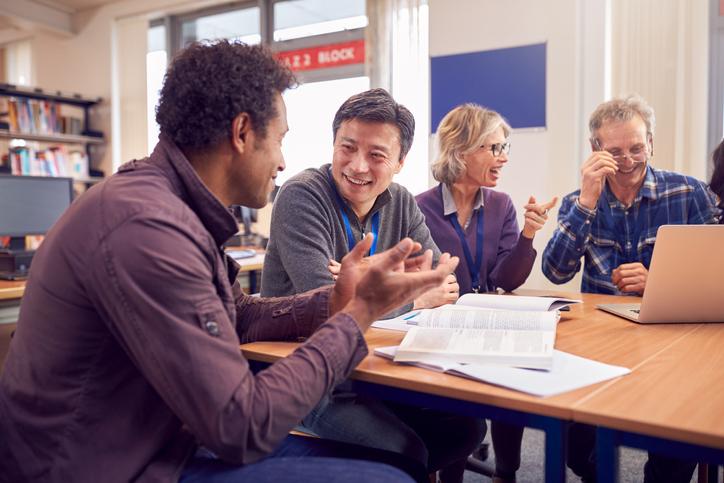A student-centric university culture is fundamental to preparing students for lifelong learning. By encouraging students to control their individual drivers and direction through a degree programme, we empower them to engage a mindset for personalised education throughout their lives. It is through our co-creation and collaboration with students that universities have a substantive role in cultivating a lifelong-learning mentality.
But what if international students are not as fluent in or comfortable with this form of university engagement? Then we have work to do to prepare them for lifelong learning so they are not left behind.
Lifelong learning is transforming education landscapes across the globe, with microcredentials, blended learning and more continuous professional development requirements in the workplace just the beginning of sector-wide change. It is what individuals need more than ever before to thrive throughout dynamic and changeable careers.
- Spotlight: Lifelong learning that will last
- Five tips for helping international students settle in their new surroundings
- Don’t forget that international students need careers support too
Universities have rapidly mobilised to become providers of lifelong learning to those who are ready for it. We build short courses, Moocs, chunked lectures, flipped classrooms, skill-based assessment and edtech that claims to deliver anything to anyone, anywhere, any time. But none of this prepares students – domestic or international – for lifelong learning. Are we missing the critical step of equipping learners with the mindset for the lifelong learning we are busily preparing to deliver?
What motivates lifelong learning?
We understand many of the motivations that build a mindset for lifelong learning. Perhaps a little cynically, workplace dissatisfaction scores high on that list. Other factors include personal growth, curiosity, networking, individual fulfilment, well-being and career advancement.
Many international students already have this mindset. Consider the motivation it takes to leave your country, to invest massively or take on enormous debt to pursue international education, to remove yourself from family, friends and culture, and to possibly build a new life in a new country with a new career, wherever that might take you. This is a self-driven, transformative mentality. As a pioneering international PhD student in regional Australia during the dying days of the White Australia policy, my Sri Lankan father-in-law transformed the trajectory of his family. This type of experience is common among our international students at the University of Canterbury | Te Whare Wānanga o Waitaha (UC). With their commitment to personal growth through learning, it could be argued that international students might be eminently prepared for a lifelong-learning journey.
However, spending thousands of hours answering student enquiries in recruitment halls around the world can be enlightening. International students often push back against modern Western approaches to academic co-design, which consider students and universities to be partners in a collaborative learning journey, where students have significant freedom to choose their own adventures. Many international students from our largest markets look to us as experts with the specialised knowledge and the responsibility to direct them towards the outcomes they need. Concepts of partnership risk the perception that we do not take that responsibility seriously. Anecdotal evidence and empirical research suggest that international students from our largest markets need time to acclimatise to Western teaching styles, to accept teachers as guides rather than enforcers, to feel comfortable making personal contributions to group tasks, and to be self-directed in a flipped-classroom learning environment.
I used to question university marketing rhetoric such as “We are a student-centred university”. Haven’t we always been focused on students? But look how far we have grown from traditional, one-size-fits-all degree programmes to programme designs that give control of the learning journey to the personal drivers of each individual student. Based on the desire for personal growth, students can co-create with universities customised education from a plethora of options, including workplace engagement, international mobility, remote attendance, a choice of electives, majors and minors, engagement with research, dual or conjoint degrees, and greater personal expression through skills-based assessment.
Welcoming international students through intercultural orientation
UC prepares international students for this engaged learning environment through an intercultural approach to first-year orientation and transition that leans heavily on the Māori concept of Manaakitanga. We offer Manaakitanga to international students: to care about their well-being and sense of belonging through hospitality and protection; to uplift and support them with humility, compassion and empathy; and to respect their individual backgrounds, mindsets and needs, which might be foreign to us. The UC orientation and transition programme delivers ongoing support not only to orientate international students within the university, but also to transition them to the mindset needed to engage fully with student-centred learning, and ultimately with the concept of lifelong learning.
The concept of ongoing transition rather than orientation in week one has rapidly gained acceptance. However, there is value in examining the intercultural competency of our orientation and transition programmes. A 2013 Unesco conceptual and operational framework for intercultural competencies broadly states that intercultural competences aim to free people from their own logic and cultural idioms. Surely that should be the aspiration of an interculturally competent orientation and transition programme: to free our students from cultural, historic or other preconceptions about higher education and prepare them to embrace a student-centred approach to learning.
UC’s orientation and transition programme, particularly as delivered through the UC Business School, has been co-designed with the Māori iwi of our region, drawing on an indigenous worldview to help overcome our own cultural preconceptions and reach out to our international students with greater cultural fluency, learning from them as they learn from us. In doing so, we stand the best chance of preparing our students for lifelong-learning journeys, irrespective of their origins and the types of teaching that they are used to.
International students have specific learning needs and are at risk of being left behind. I believe preparing international students for lifelong learning is so important that to fail this responsibility would be to neglect our overarching pastoral care obligations.
Graham Wise is the director of international development at the University of Canterbury | Te Whare Wānanga o Waitaha, in Ōtautahi Christchurch, Aotearoa New Zealand.
If you would like advice and insight from academics and university staff delivered direct to your inbox each week, sign up for the Campus newsletter.




comment